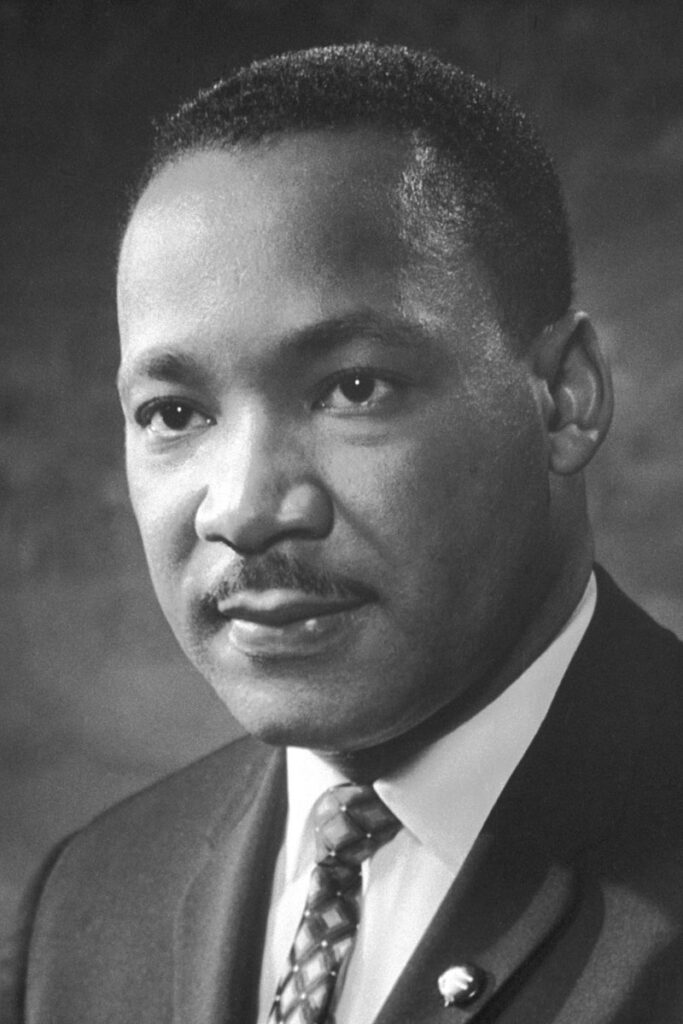Martin Luther King, Jr. and The Beloved Community

Credit: Nobel Foundation via Wikimedia Commons
Licence: Public Domain
1964
| Giver: | Other |
|---|---|
| Receiver: | Other |
| Gift: | Other |
| Approach: | Other |
| Issues: | 1. No Poverty, 10. Reduced Inequalities, 16. Peace, Justice and Strong Institutions, 2. Zero Hunger, 5. Gender Equality, 8. Decent Work and Economic Growth |
Martin Luther King, Jr. (1929-1968), Baptist minister and social activist, led the American Civil Rights Movement from the mid-1950s until he was assassinated in 1968. Inspired by the spiritual example of Jesus Christ and schooled in the civil disobedience tactics of Mahatma Gandhi (1869-1948), King avowed nonviolence as the only true remedy for the interrelated evils of poverty, racism and militarism.
In King’s expansive vision, nonviolence is more than a mechanism for social change: it is a transformational attitude of heart, and a way of life that seeks to overcome injustice not by humiliating and defeating its perpetrators, but by summoning their goodness and winning their friendship and understanding. As nonviolence yields redemption and reconciliation, it enables the creation of what King often referred to as The Beloved Community, a peaceful, just and equitable society that is motivated and unified by what is known in the Christian tradition as agape love. In “Pilgrimage to Nonviolence,” King describes agape as the highest, most selfless and inclusive form of love: “It is love in action…love seeking to preserve and create community…a willingness to sacrifice in the interest of mutuality.”
King believed the Beloved Community was possible, but he had no illusions that it could be dreamed into being. Rather, he continuously taught, the aspiration must be actively forged by a critical mass of people committed to the practice of nonviolence and willing to transcend narrow self-interest in service to the greater good. “In a sense, every day is judgment day,” King counsels:
and we, through our deeds and words…are constantly writing the Book of Life. Light has come into the world, and every man must decide whether he will walk in the light of creative altruism or the darkness of destructive selfishness. This is the judgment. Life’s most persistent and urgent question is, ‘What are you doing for others?’ (“Three Dimensions of a Complete Life”)
Under King’s leadership, civil rights activists employed nonviolent direct action – including boycotts, sit-ins and marches – to bring about major legislative milestones for racial justice in the United States, including the Civil Rights Act of 1964 and the Voting Rights Act of 1965. In the last years of his life, King spoke out forcefully against the Vietnam War and began to mount his Poor People’s Campaign, an ambitious new initiative to build solidarity among people of all races and backgrounds in the fight for economic justice. Despite King’s tireless efforts, The Beloved Community was far from realized when he was shot dead in April 1968 at the age of 39.
In the decades following King’s tragic death, his widow Coretta Scott King (1927-2006) led ongoing efforts to honor his memory and further his legacy. Since 1986, the U.S. has observed Martin Luther King, Jr. Day on the third Monday in January as a federal holiday. In 1994 Congress further designated the holiday as a National Day of Service, reaffirming King’s call to cultivate nonviolence and the generous spirit of _agape _love by working together for the collective good.
Contributor: Erin Brown
| Source type | Full citation | Link (DOI or URL) |
|---|---|---|
| Book |
King, Martin Luther, Jr., “Pilgrimage to Nonviolence,” In A Martin Luther King Treasury, 64-73. Yonkers, NY: Educational Heritage, 1964. |
https://archive.org/details/martinlutherking0001unse/page/70/mode/2up?q=service |
| Book |
King, Martin Luther, Jr., “Three Dimensions of a Complete Life,” In A Martin Luther King Treasury, 198-205. Yonkers, NY: Educational Heritage, 1964. |
https://archive.org/details/martinlutherking0001unse/page/28/mode/2up?q=service |
| Publication |
National Museum of African American History and Culture. “The 15 Year Battle for Martin Luther King, Jr. Day.” Accessed May 12, 2024. |
https://nmaahc.si.edu/explore/stories/15-year-battle-martin-luther-king-jr-day |
| Publication |
Patterson, James M. “A Covenant of the Heart: Martin Luther King Jr., Civil Disobedience, and the Beloved Community.” American Political Thought 7, no. 1 (2018): 124–51. |
https://www.jstor.org/stable/26543289 |
| Website |
The King Center. “The King Philosophy – Nonviolence365.” Accessed May 13, 2024. |
https://thekingcenter.org/about-tkc/the-king-philosophy/ |